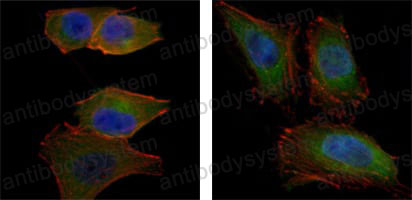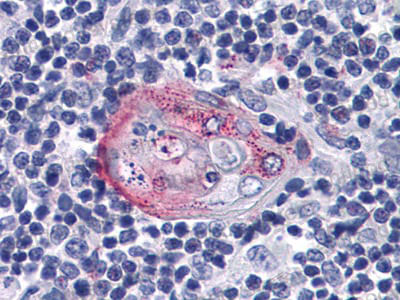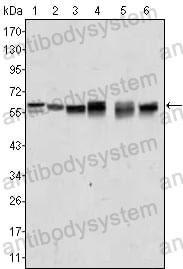Catalog No.
RHD96601
Species reactivity
Human, Rat, Monkey
Host species
Mouse
Isotype
IgG2b
Clonality
Monoclonal
Tested applications
IF: 1:200-1:1000, IHC: 1:200-1:1000, WB: 1:500-1:2000
Target
PKB beta, Protein kinase Akt-2, AKT2, Protein kinase B beta, RAC-beta serine/threonine-protein kinase, RAC-PK-beta
Concentration
1 mg/ml
Endotoxin level
Please contact with the lab for this information.
Purity
>95% as determined by SDS-PAGE.
Purification
Protein A/G purified from cell culture supernatant.
Accession
P31751
Applications
IF, IHC, WB
Form
Liquid
Storage buffer
0.01M PBS, pH 7.4, 0.05% Sodium Azide.
Stability and Storage
Use a manual defrost freezer and avoid repeated freeze-thaw cycles. Store at 4°C short term (1-2 weeks). Store at -20°C 12 months. Store at -80°C long term.
Clone ID
R3J20
Homologous recombination proficient subtypes of high-grade serous ovarian cancer: treatment options for a poor prognosis group., PMID:38894867
Phosphatidylinositol 4-Kinase III Alpha Governs Cytoskeletal Organization for Invasiveness of Liver Cancer Cells., PMID:38636680
K-Ras(V12) differentially affects the three Akt isoforms in lung and pancreatic carcinoma cells and upregulates E-cadherin and NCAM via Akt3., PMID:38291468
Nogo-B deficiency suppresses white adipogenesis by regulating β-catenin signaling., PMID:36931495
Clinical implications of tumor-based next-generation sequencing in high-grade epithelial ovarian cancer., PMID:36930815
Akt1-dependent expression of angiopoietin 1 and 2 in vascular smooth muscle cells leads to vascular stabilization., PMID:35931736
Analysis of rs1864182 and rs1864183 variants in ATG10 gene and antineutrophil cytoplasmic autoantibody-associated vasculitis in Chinese Guangxi population., PMID:34961976
Blockade of macrophage-associated programmed death 1 inhibits the pyroptosis signalling pathway in sepsis., PMID:34382103
Profiling of three H3F3A-mutated and denosumab-treated giant cell tumors of bone points to diverging pathways during progression and malignant transformation., PMID:33707617
Ultrasound molecular imaging-guided tumor gene therapy through dual-targeted cationic microbubbles., PMID:33594996
Isoform- and Phosphorylation-specific Multiplexed Quantitative Pharmacodynamics of Drugs Targeting PI3K and MAPK Signaling in Xenograft Models and Clinical Biopsies., PMID:33536190
The endocannabinoid 2-arachidonoylglycerol and dual ABHD6/MAGL enzyme inhibitors display neuroprotective and anti-inflammatory actions in the in vivo retinal model of AMPA excitotoxicity., PMID:33450278
An AKT2-specific nanobody that targets the hydrophobic motif induces cell cycle arrest, autophagy and loss of focal adhesions in MDA-MB-231 cells., PMID:33378961
Semaphorin 4A antibody alleviates arsenic-induced hepatotoxicity in mice via inhibition of AKT2/NF-κB inflammatory signaling., PMID:33290778
Akt isoform-specific effects on thyroid cancer development and progression in a murine thyroid cancer model., PMID:33110146
Development and characterization of protein kinase B/AKT isoform-specific nanobodies., PMID:33045011
AKT2 deficiency impairs formation of the BCR signalosome., PMID:32252758
The AKT isoforms 1 and 2 drive B cell fate decisions during the germinal center response., PMID:31767615
CXCL13 is a differentiation- and hypoxia-induced adipocytokine that exacerbates the inflammatory phenotype of adipocytes through PHLPP1 induction., PMID:31710352
Protein kinase Akt2/PKBβ is involved in blastomere proliferation of preimplantation mouse embryos., PMID:31552693
Neutrophils homing into the retina trigger pathology in early age-related macular degeneration., PMID:31552301
Akt3-Mediated Protection Against Inflammatory Demyelinating Disease., PMID:31404142
Evaluation of the Insulin-like Growth Factor Receptor Pathway in Patients with Advanced Breast Cancer Treated with Trastuzumab., PMID:30343280
AKT2 is the predominant AKT isoform expressed in human skeletal muscle., PMID:29595878
Electroacupuncture mitigates endothelial dysfunction via effects on the PI3K/Akt signalling pathway in high fat diet-induced insulin-resistant rats., PMID:29502072
Epithelial mesenchymal transition induced by the CXCL9/CXCR3 axis through AKT activation promotes invasion and metastasis in tongue squamous cell carcinoma., PMID:29286143
miR-608 regulates apoptosis in human lung adenocarcinoma via regulation of AKT2., PMID:29075783
TRAIL DR5-CTSB crosstalk participates in breast cancer autophagy initiated by SAHA., PMID:29018571
Immuno-Matrix-Assisted Laser Desorption/Ionization Assays for Quantifying AKT1 and AKT2 in Breast and Colorectal Cancer Cell Lines and Tumors., PMID:28853539
Exploiting Radiation-Induced Signaling to Increase the Susceptibility of Resistant Cancer Cells to Targeted Drugs: AKT and mTOR Inhibitors as an Example., PMID:28802252
Human Plasma Thioredoxin-80 Increases With Age and in ApoE-/- Mice Induces Inflammation, Angiogenesis, and Atherosclerosis., PMID:28473446
AKT2 Regulates Pulmonary Inflammation and Fibrosis via Modulating Macrophage Activation., PMID:28455433
Autophagy confers resistance to lipopolysaccharide-induced mouse hepatocyte injury., PMID:27469366
Establishment of a multimarker qPCR panel for the molecular characterization of circulating tumor cells in blood samples of metastatic breast cancer patients during the course of palliative treatment., PMID:27223437
Stability and function of adult vasculature is sustained by Akt/Jagged1 signalling axis in endothelium., PMID:26971877
The Effects of 52 Weeks of Soccer or Resistance Training on Body Composition and Muscle Function in +65-Year-Old Healthy Males--A Randomized Controlled Trial., PMID:26886262
ETP-46321, a dual p110α/δ class IA phosphoinositide 3-kinase inhibitor modulates T lymphocyte activation and collagen-induced arthritis., PMID:26883061
Akt2 and p-Akt overexpression in oral cancer cells is due to a reduced rate of protein degradation., PMID:26393327
Did circulating tumor cells tell us all they could? The missed circulating tumor cell message in breast cancer., PMID:26349664
Mechanical stretch enhances the expression and activity of osteopontin and MMP-2 via the Akt1/AP-1 pathways in VSMC., PMID:25986148
Activation of TGF-β-induced non-Smad signaling pathways during Th17 differentiation., PMID:25823994
Cep55 regulates embryonic growth and development by promoting Akt stability in zebrafish., PMID:25667221
Silencing of COX-2 by RNAi modulates epithelial-mesenchymal transition in breast cancer cells partially dependent on the PGE2 cascade., PMID:25520137
MicroRNA-29s could target AKT2 to inhibit gastric cancer cells invasion ability., PMID:25428377
Cotargeting of epidermal growth factor receptor and PI3K overcomes PI3K-Akt oncogenic dependence in pancreatic ductal adenocarcinoma., PMID:24895459
AKT/mTOR and c-Jun N-terminal kinase signaling pathways are required for chrysotile asbestos-induced autophagy., PMID:24735948
Phosphorylation of SRSF1 by SRPK1 regulates alternative splicing of tumor-related Rac1b in colorectal cells., PMID:24550521
PI3K/PTEN/AKT/mTOR polymorphisms: association with clinical outcome in patients with head and neck squamous cell carcinoma receiving cetuximab-docetaxel., PMID:24421178
Characterization of the Akt2 domain essential for binding nuclear p21cip1 to promote cell cycle arrest during myogenic differentiation., PMID:24194853
Identification and quantification of AKT isoforms and phosphoforms in breast cancer using a novel nanofluidic immunoassay., PMID:23929892



